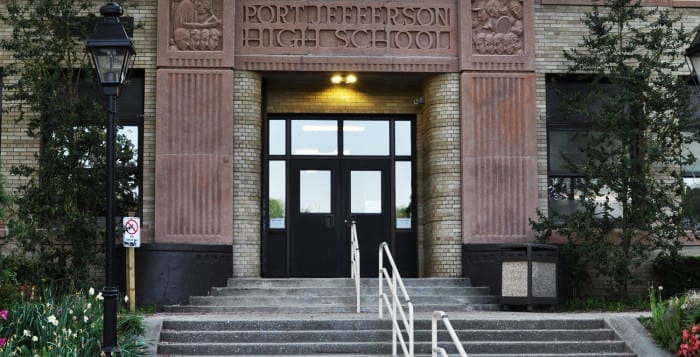Port Jeff BOE introduces candidates for next board and gives budget details
By Sabrina Artusa
Two incumbents and one newcomer are vying for two seats on the Port Jefferson Board of Education. Ellen Boehm, current president, Randi DeWitt, current board member and challenger Jennie Berges attended a PTA-sponsored event to project their positions on district issues.
Berges, a mom of three and the only candidate with children currently in the district, is a mental health counselor who is running to “be a voice” for parents and teachers who want to feel connected to the administration.
Dewitt is a first-grade teacher of 26 years in another district and a lifelong Port Jefferson resident and attended the Port Jefferson School District herself before raising two children who graduated the district. “My platform is to continue to advocate for our students and to continue our district’s reputation for academic excellence,” she said. Her current term as a board member expires this year.
Boehm, current president of the BOE, also graduated from the district and had children who did as well. She has been on the board since 2012 and took on the role of president five years ago.
All three candidates acknowledge diminishing enrollment as an issue, although it is a trend that most schools have experienced post-COVID, according to data from the New York State Education Department. Already a small district, the candidates spoke of how it factors in to board decisions.
Berges said it is a draw that the board could potentially build off of the “smaller community feel” and intimate class sizes could be attractive to many families, as they were for hers. “Declining enrollment is a challenge,” she said. “Having a small school shouldn’t be. I think there are ways to work with what we have to work within the integrity of that.”
The district is responding to the trend. Superintendent Jessica Schmettan said that there are fewer classes for certain grades. Programs are continuing strong, and even expanding in some areas such as full-day prekindergarten and a breakfast program.
Addressing taxes, Boehm said she applauds administrators for keeping taxes lower than neighboring districts, but that residents on fixed income, including herself, are “feeling the strain.”
“I think it is really important that as a board and a district…that they stand behind the students and evaluate what is best for the students of Port Jeff. My hope is that it keeps programs intact. Does it mean that every teacher will be here forever? I don’t know.”
2025-2026 budget
The board held their last public hearing on the $49,406,575 budget on May 13 – a 2.89% increase from last years’ budget with a $741,969 increase in the tax levy from last years’ $39,396,316. The district lost around $111,000 in state aid.
The district continues to tackle costs amid the $16.5 million Child Victims Act settlement, which Schmettan said will have no effect on programing or quality of education to the students. WIth $5.1 million already paid, the district is under a one-year borrowing contract with Oppenheimer & Co for the remaining cost while they pursue potential solutions with the state. Around $400,000 from the undesignated reserve will be expended in the 2025-2026 school year to cover the interest.
Now confronted with expenses that were previously shouldered by LIPA’s tax payments, Dewitt and Boehm said they explored the possibility of redefining the district lines, thus including more homes in their area and bringing in more revenue and students, but were unable to appeal to neighboring districts.
On May 20 voters will also weigh in on a proposition pertaining to the renovation of the HVAC system, described as old and “inefficient” by Deputy Superintendent Sean Leister. “The pipes throughout the building are literally crumbling in our hands, he said. “I spent between $165,000 and $200,000 in repairs this year alone.”
The board would like to use up to $3.2 million in capital reserves designated for upgrades and renovations to aid in financing the new system. Leister said that if the system isn’t repaired, the heat could reach unsafe levels by state standards and require the students to be sent home. Currently, they have to choose which rooms to air condition, he added.
Voting will take place from 6 a.m. to 9 p.m. on May 20 in the Earl L. Vandermeulen High School Cafeteria.







